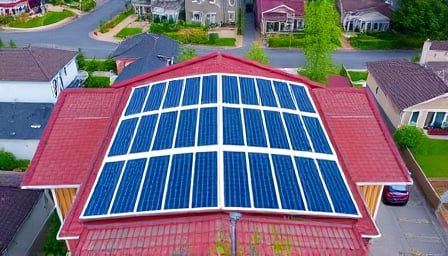Loblaw Cos Ltd: A Bold Leap into Renewable Energy
In a decisive move that underscores its commitment to sustainability, Loblaw Companies Limited has announced plans to install what is set to be Canada’s largest rooftop solar system at its East Gwillimbury Distribution Centre in Ontario. This ambitious project, slated to cover an impressive 435,000 square feet of roof space, is not just a testament to Loblaw’s dedication to renewable energy but also a strategic step towards achieving its net-zero goals.
The 7.5 MW solar array is expected to generate over 8,500,000 kWh annually, providing up to 25% of the total energy consumed at the distribution centre. This initiative is a clear indication of Loblaw’s proactive approach to leveraging its infrastructure for environmental benefits. As Tom Marson, VP of Buildi, aptly noted, the company recognized the potential of its rooftop space early in the construction phase and has since been committed to harnessing clean, renewable energy.
This move is particularly significant given the current market dynamics. With Loblaw’s stock trading at CAD 221.43 as of July 27, 2025, and a market cap of CAD 66.34 billion, the company is in a strong position to invest in such transformative projects. The solar installation not only aligns with global sustainability trends but also positions Loblaw as a leader in the consumer staples sector, which is increasingly under pressure to adopt greener practices.
George Weston Limited: Enhancing Shareholder Value
In related news, George Weston Limited, a key player in the same sector, has announced a three-for-one stock split. This strategic decision, effective at the close of business on August 18, 2025, aims to make the company’s shares more accessible to retail investors and employees participating in its Employee Share Ownership Plan. By issuing two additional shares for each share held, Weston is enhancing liquidity without diluting shareholder equity.
This stock split is a savvy move in the current financial climate, where accessibility and liquidity are paramount for retail investors. It reflects Weston’s understanding of market dynamics and its commitment to maintaining shareholder value. As Loblaw continues to make strides in sustainability, Weston’s focus on financial accessibility underscores the diverse strategies companies in the consumer staples sector are employing to navigate the evolving market landscape.
Conclusion
Loblaw’s investment in renewable energy and Weston’s stock split are indicative of broader trends in the consumer staples sector. As companies strive to balance sustainability with financial performance, these initiatives highlight the innovative approaches being adopted to meet both environmental and economic goals. For investors and stakeholders, these developments signal a promising direction for the sector, characterized by a commitment to sustainability and shareholder value.
